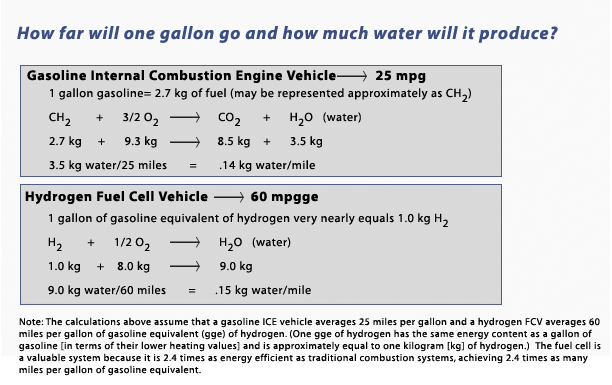Environment & Energy
Related: About this forumThe Heartbeat of China: Betting Big on Hydrogen. Join CGTN & travel to south China's Foshan, a city on the cutting edge
The Heartbeat of China: Betting Big on Hydrogen. Join CGTN anchor Xu Qinduo, David Blair & Shen Yiyang as they travel to south China's Foshan, a city on the cutting edge of exploring the potential of hydrogen energy
Just following through with what the real "Father of Electric Vehicles" said a few years ago
"Hydrogen Is the Future"
Duppers
(28,247 posts)brush
(57,630 posts)Think. Again.
(18,072 posts)...the electrolysis process, 'Green' H2 is made using specifically non-CO2 energy sources for that.
There have also been some recent discoveries of naturally occurring or 'White' H2, but more exploration needs to be done to gauge the extent of those or other reservoirs.
brush
(57,630 posts)if the hydrogen produced by the electrolysis process costs more energy to produce than it yields, where does that get us?
Think. Again.
(18,072 posts)...wil always lose a certain amount of energy in that transfer.
Even charging a common electric vehicle today will use more energy to do the charging than actually ends up in the battery, and the kinetic (movement) energy produced by that battery is less than the battery used to produce it.
The benefits of using hydrogen instead of directly tying to an electric power plant are numerous. Hydrogen, as an energy storage medium, is much lighter weight than battery systems and more stored energy can be transported in H2 tanks than large batteries could ever do.
In addition to the electrical energy stored in H2, that same H2 can also be used in combustion applications such as heavy agricultural equipment or even heating systems with a much higher tempurature output than burning fossil fuels.
The loss of energy from producing H2 is somewhat meaningless since most Green H2 production plants are built with their own dedicated solar, wind, or nuclear components which are sized to create as much energy as is needed for whatever volume of H2 is being produced, and so no energy that might be used elsewhere is taken away from any grid.
Also, the 'price' of H2 already has all those production costs added in, and that price is already coming down toward the price of fossil fuels even before the industry is anywhere near scaling up to market size.
brush
(57,630 posts)as is the production using solar and wind.
Think. Again.
(18,072 posts)...the same H2 could be used for either electrical applications, combustion applications, or thermal applications.
brush
(57,630 posts)I posted a thread that took the position that E-vehicles IMO were a stop gap, temporary solution to EC-vehicles, not just because of the limited range compared to EC-vehicles, but also because of the huge cost of replacing the battery, which can be more than the vehicle is then worth.
I got slammed immediately, probably by E-vehicle owners who've yet had to replace their batteries.
Hydrogen-cell powered vehicles seem to have great promise.
One question though: Since H-vehicle emissions are water, is there a way to collect the emissions, as what happens in winter climates as H2O emissions freeze and make roads slick?
Think. Again.
(18,072 posts)...of materials and minerals needed for a robust battery-based industry. Eventually, we would have to transition again away from batteries.
And I share your question about water emissions, my concern is that if all our vehicles in crowded areas are emitting water, would we be creating a new water 'pollution' problem where we are inundated with more constant water in those areas than our infrastructure is built for? I don't know the quantity of water actually emitted by an average H2 vehicle, but your point about creating icy road conditions that keep building up in cold areas is a valid point.
Caribbeans
(983 posts)One question though: Since H-vehicle emissions are water, is there a way to collect the emissions,
It would seem to be just a matter of directing the water "exhaust" through some tubing to a tank that, once full, then diverts the water back outside the car -see the Mercedes video below. This is one of the great things about totally new tech, the innovation hasn't even really begun yet. Already we have the top engineers in China and now India working on these things (instead of drone bombs and surveillance tech) and in a few years it may be a whole new world.
what happens in winter climates as H2O emissions freeze and make roads slick?
Here's a page from US Energy.gov - also remember that even the water emissions from a fleet of H2 cars wouldn't come close to the amount of rain that drops in a few seconds.
Energy.gov: Water Emissions from Fuel Cell Vehicles
Hydrogen fuel cell vehicles (FCVs) emit approximately the same amount of water per mile as vehicles using gasoline-powered internal combustion engines (ICEs).
https://www.energy.gov/eere/fuelcells/water-emissions-fuel-cell-vehicles
The water that comes out of an ICE is vaporized, out of sight out of mind and all
Defying Death Valley - Mercedes-Benz original with Diane Kruger
What happens when Hollywood stars Diane Kruger and Joshua Jackson are trying to survive in the desert only by the water produced by their F-CELL car? Driving the fuel cell technology on a daily basis in Hollywood, the film stars Diane Kruger and Joshua Jackson have become enthusiastic about the potential that the fuel cell technology offers. The film explains the advantages of the F-CELL technology on a trip in California's Death Valley, one of the hottest and driest places on earth.
Once you have water again - after making electricity - you have more fuel
brush
(57,630 posts)Think. Again.
(18,072 posts)...the first video was really good at explaining some of the complex questions of the role H2 will be playing in the fossil-free future.
